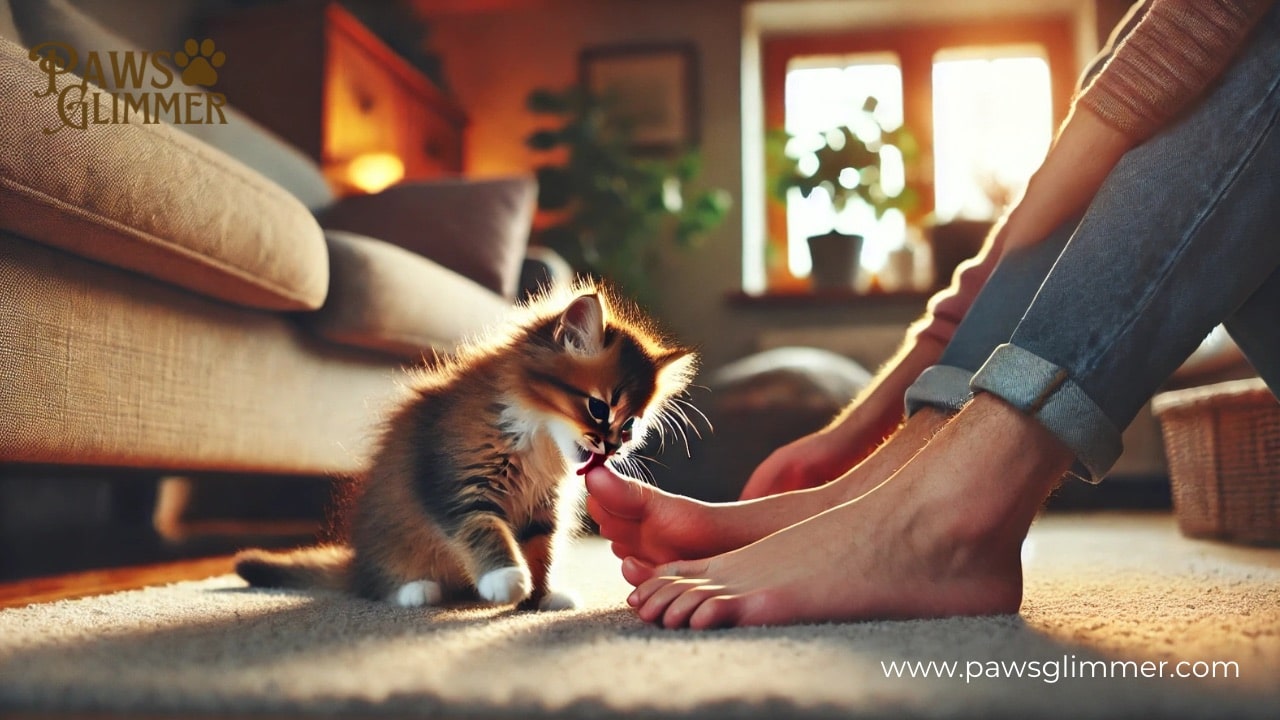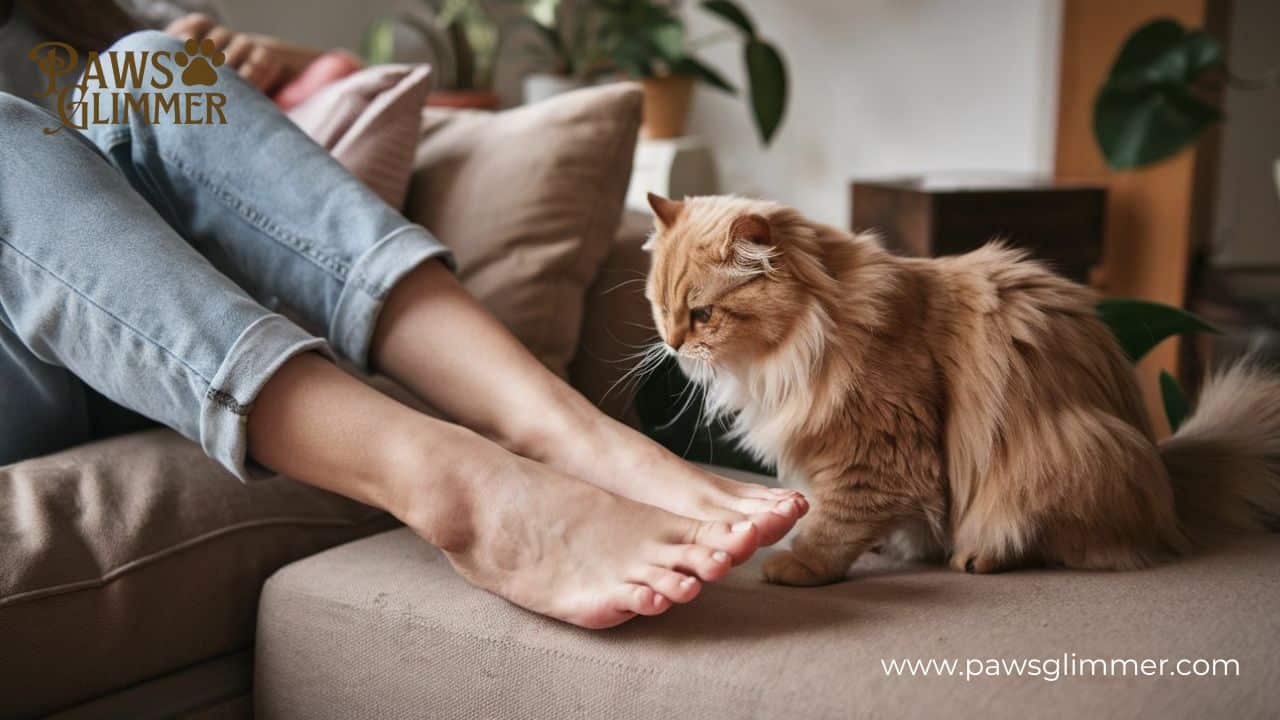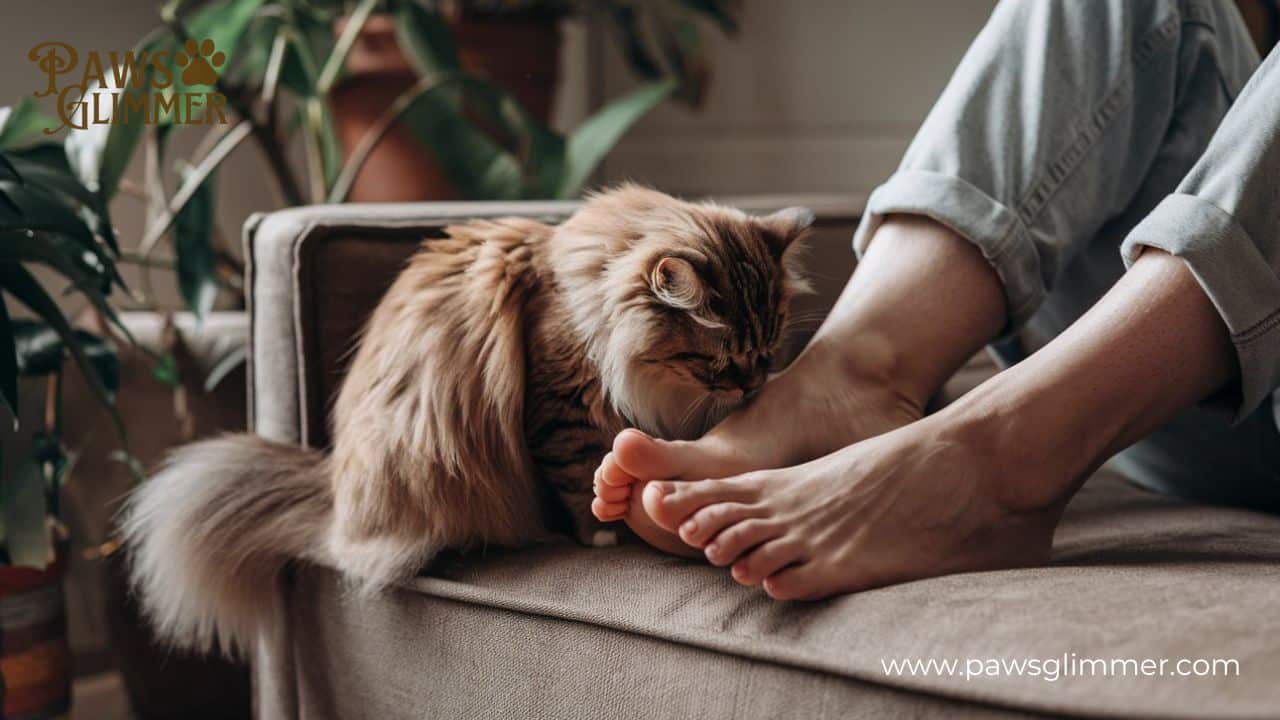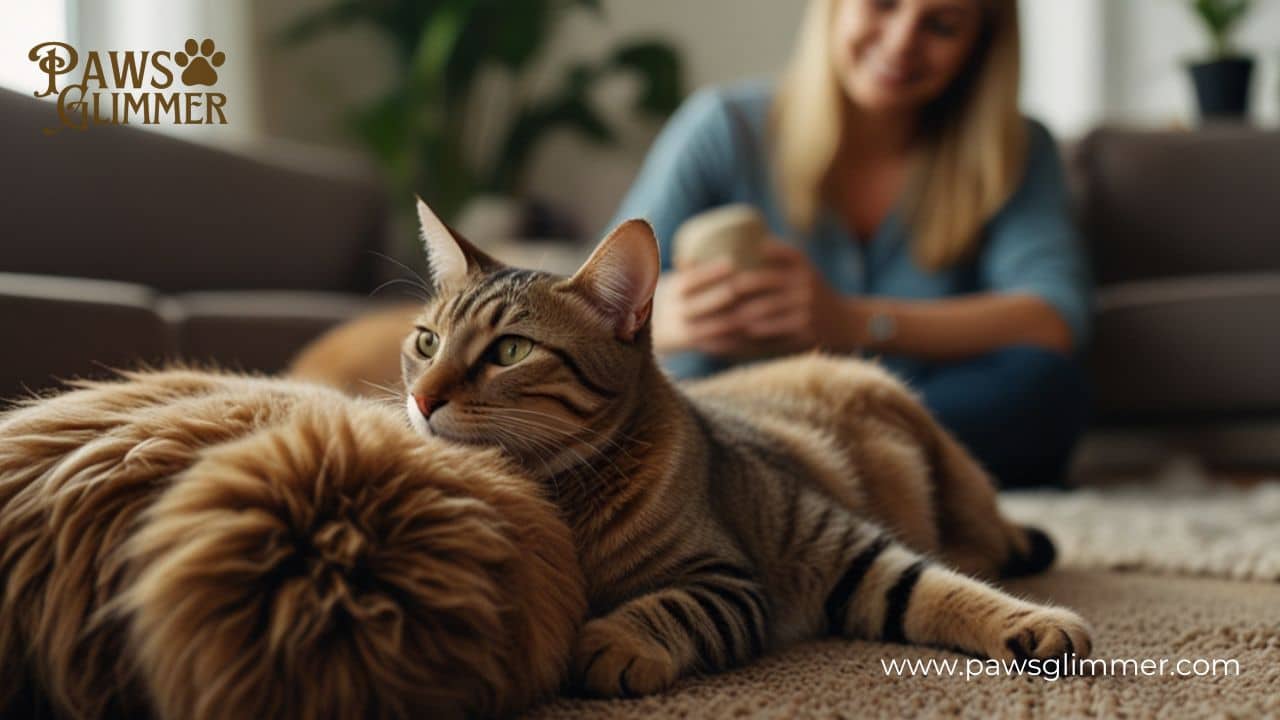Cats are enigmatic creatures, full of surprises and peculiar habits. One behavior that often leaves cat owners scratching their heads is the curious tendency of some felines to lick their human’s feet. If you’ve ever wondered, “Why does my cat lick my feet?” you’re not alone.
This comprehensive guide will delve into the fascinating world of feline behavior and explore the reasons behind this peculiar habit, helping you understand your cat’s unique ways of expressing affection or seeking attention.
Understanding Cat Behavior: A Quick Primer
Before we dive into the specific reasons why your cat might be licking your feet, it’s essential to understand some basics of feline behavior. Cats are complex creatures with intricate social structures and communication methods. Their behavior is often rooted in instinct, learned experiences, and environmental factors.
You May Also Like Mushrooms Soup For Dogs
The Importance of Grooming in Feline Life

Grooming is a fundamental aspect of a cat’s daily routine. It serves multiple purposes:
- Hygiene maintenance
- Temperature regulation
- Stress relief
- Social bonding
Cats spend a significant portion of their day engaged in grooming behaviors, whether it’s licking themselves, other cats, or even their human companions.
Scent Communication: The Feline Language
Cats have an incredibly developed sense of smell, with powerful scent receptors that play a crucial role in how they perceive and interact with their environment. Scent is a primary form of communication for cats, used to:
- Mark territory
- Identify family members
- Detect potential threats or food sources
Understanding these basic aspects of cat behavior sets the stage for exploring why your feline friend might be so fascinated with your feet.
6 Common Reasons Your Cat Might Be Licking Your Feet

Now, let’s unravel the mystery behind your cat’s foot-licking behavior. Here are six common reasons why your cat might be showing such interest in your toes:
1. Showing Affection: The Feline Love Language
When your cat licks your feet, it might simply be a display of affection. In the world of feline interaction, grooming is a sign of love and care. Mother cats groom their kittens, and adult cats often groom each other as a social bonding activity.
Case Study: Sarah’s Cat, Mittens
Sarah noticed that her cat, Mittens, would often lick her feet after she returned home from work. A feline behaviorist explained that this was likely Mittens’ way of welcoming Sarah back into the “family group” and reaffirming their bond.
This behavior is linked to the release of oxytocin, often called the “love hormone,” which strengthens the bond between cats and their human companions.
2. Taste Exploration: Your Feet as a Flavor Adventure

As odd as it may sound, your feet might be a source of intriguing flavors for your cat. Human feet contain sweat glands that produce a salty secretion, which some cats find appealing.
Moreover, any residual scents from:
- Food
- Lotions
- Soaps
can make your feet an interesting sensory experience for your feline friend.
| Possible Foot Flavors | Cat’s Reaction |
|---|---|
| Salty sweat | Often appealing |
| Food residue | Highly attractive |
| Lotion or cream | Intriguing scent and taste |
| Soap | May be interesting or repelling |
3. Stress Relief: Comfort in Rhythmic Actions
Licking can be a self-soothing mechanism for cats experiencing anxiety or stress. The repetitive action of licking releases endorphins, which can help calm an anxious cat.
Signs your cat might be stressed:
- Excessive grooming
- Changes in appetite
- Increased vocalization
- Hiding or avoiding interaction
If you notice these signs along with increased foot-licking, it might be time to assess your cat’s environment and possibly consult with a veterinarian.
4. Attention-Seeking Behavior: Look at Me, Human!
Cats are intelligent creatures that quickly learn which behaviors elicit responses from their human companions. If your cat has discovered that licking your feet gets your attention, they may repeat this behavior when they want to interact with you.
“Cats are masters at training their humans. If a behavior works to get what they want, they’ll keep doing it.” – Dr. Emily Parker, Feline Behaviorist
To address attention-seeking behavior:
- Provide regular playtime
- Offer environmental enrichment
- Respond to positive behaviors
- Ignore unwanted behaviors (when safe to do so)
5. Marking Territory: You’re Mine, Feet and All

Cats have scent glands in their mouths, and by licking your feet, they may be marking you as part of their territory. This marking behavior is a way for cats to create a familiar, comforting scent in their environment.
In multi-pet households, you might notice increased foot-licking as cats try to maintain a consistent “family scent” among all members of the household.
6. Medical Issues: When Licking Might Signal a Problem
While less common, persistent foot-licking could be a sign of underlying medical issues. These might include:
- Obsessive-compulsive disorders
- Nutritional deficiencies
- Gastrointestinal problems
If your cat’s foot-licking behavior seems excessive or is accompanied by other changes in behavior or health, it’s crucial to consult with a veterinarian.
Is It OK to Let Your Cat Lick Your Feet?
While occasional foot-licking is generally harmless, there are some considerations to keep in mind:
Hygiene Concerns feet can harbor bacteria and fungi, which may be harmful if ingested by your cat. Additionally, any lotions, creams, or medications on your feet could be potentially toxic to your feline friend.
Potential Risks
- For Your Cat:
- Ingestion of harmful substances
- Hairballs from excessive licking
- Reinforcement of obsessive behaviors
- For You:
- Increased risk of fungal infections
- Skin irritation from rough cat tongues
How to Stop Your Cat From Licking Your Feet

If you’re not comfortable with your cat’s foot-licking behavior, there are several strategies you can employ to discourage it:
Positive Reinforcement Techniques
- Redirect Attention: When your cat starts licking your feet, offer a toy or engage them in play.
- Reward Alternative Behaviors: Praise and treat your cat when they engage in desired behaviors.
- Consistent Response: Ensure all family members respond similarly to the behavior.
Environmental Enrichment Strategies
Providing a stimulating environment can help reduce attention-seeking behaviors:
- Interactive Toys: Puzzle feeders, cat trees, and rotating toy selections
- Outdoor Playtime: Supervised outdoor experiences or a catio
- Social Interaction: Regular play sessions and quality time with you
When to Seek Veterinary Advice
If the behavior persists despite your efforts, or if you notice any of the following, consult with your veterinarian:
- Excessive or obsessive licking
- Changes in appetite or water consumption
- Lethargy or behavioral changes
- Signs of gastrointestinal distress
The Flip Side: When Cats Hate Feet
While some cats are fascinated by feet, others may show aversion or aggression towards them. This could be due to:
- Past negative experiences
- Overstimulation
- Territorial behavior
Respecting your cat’s boundaries is crucial for maintaining a positive relationship. If your cat shows signs of discomfort around feet, it’s best to give them space and avoid forcing interaction.
Conclusion: Decoding Your Cat’s Foot Fetish
Understanding why your cat licks your feet involves considering various aspects of feline behavior, from affection and exploration to stress relief and attention-seeking. By observing your cat’s overall behavior and considering the context in which the foot-licking occurs, you can better interpret this quirky habit.
Remember, each cat is unique, and what drives one cat to lick feet might not apply to another. The key is to remain patient, observant, and responsive to your feline friend’s needs. Whether you choose to allow the behavior or gently discourage it, maintaining a strong, positive bond with your cat should always be the priority.
FAQs About Cat Foot-Licking Behavior
Q: Is it safe for cats to lick feet?
A: While occasional licking is generally harmless, it’s best to discourage the behavior due to potential hygiene concerns and the risk of ingesting harmful substances.
Q: Why does my cat only lick one person’s feet?
A: Cats may show preference based on individual scent, familiarity, or positive associations with a particular person.
Q: Can I train my cat to stop licking feet?
A: Yes, through consistent positive reinforcement and redirection techniques, you can discourage the behavior over time.
Q: Should I be concerned if my cat suddenly starts licking feet?
A: Sudden changes in behavior can indicate stress or health issues. If accompanied by other behavioral changes, consult with a veterinarian.
Q: Do all cats lick feet, or is my cat just weird?
A: Not all cats lick feet. This behavior varies among individuals and can be influenced by factors like personality, environment, and past experiences.
By understanding the reasons behind your cat’s foot-licking behavior, you can better address their needs and strengthen your bond. Whether it’s a sign of affection, stress relief, or simply curiosity, this quirky habit is just one of the many ways our feline friends keep us on our toes!

Raymond Dandan is a seasoned pet blogger with a passion for feline care and behavior. With years of experience and a deep love for cats, Raymond brings expert insights and practical tips to “PawsGlimmer.” His engaging writing and thorough research help cat owners provide the best for their furry friends, making him a trusted voice in the pet community.







